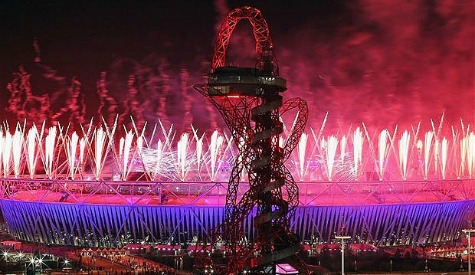 Rugby has the perfect opportunity to bottle the feel-good vibes coursing through London by announcing with immediate effect that it intends to use the Olympic Stadium as a venue for at least two high-profile matches in the 2015 World Cup, one of them being a semi-final.
Rugby has the perfect opportunity to bottle the feel-good vibes coursing through London by announcing with immediate effect that it intends to use the Olympic Stadium as a venue for at least two high-profile matches in the 2015 World Cup, one of them being a semi-final.
Such matters will not be decided until the end of the year and there are tangled logistical issues to resolve (such as a capacity reduction to 60,000) but no matter.
Now is the moment to capitalise on the need that is in the public consciousness.
The nation is bereft, aching for more. What can fill that void? Enter RWC 2015, the next major sporting event to take place here.
You might think that rugby had few concerns about flogging its wares.
Its audience has always been receptive, its constituency well-defined as well as well-heeled.
Well, much of that is hokum. Just because international matches at Twickenham are sold out does not mean that the tickets are ending up in the hands of the right people.
The 2012 Games proved the power of the common man to embrace sport for all the right reasons, to cheer, to yell, to be partisan but also to be caring, above all to be inclusive.
That is the symbolic value of staging matches at the Olympic Park in 2015.
It would signal a desire to be accessible. It would also provide a ‘wow’ moment.
Rather than there being a predictable three-year build-up with worthy ventures and the identification of solid rugby venues such as Welford Road and Kingsholm or the Millennium Stadium, the Olympic Stadium would be a globally recognisable point of difference.
The World Cups that have been a triumph have, by accident or design, had a signature moment, a unique selling point such as New Zealand’s ‘Stadium of Four Million’ mantra, a marketing construct that worked as 133,000 visitors from overseas were welcomed into Kiwi hearts and homes exactly 12 months ago.
France gave us its regional diversity four years earlier while Australia in 2003 made big play of its ‘Adopt a Team’ philosophy.
In 1995 there was Nelson Mandela on the podium but not even Boris could pull off that stunt and engage an entire rainbow nation.
RWC 2015 (Sept 18-Oct 31) has to show that the tournament will be far more than a Six Nations Championship and a November series bundled together, merely a bumper catalogue of rugby matches.
It has to be a tournament that has a soul, one that reaches out to a much wider community, or it will have failed.
No one pretends that it will be easy. Rugby has to battle to make its mark and there is more competition on the news agenda in England than in New Zealand.
The right tone has to be set and that cannot start too soon.
The summary moving aside of Paul Vaughan last week as England Rugby 2015 chief executive to make way for Debbie Jevans, fresh from a headline role as director of sport at London 2012, recognises that the game has changed with the success of the Olympics. More has to be done.
There is need for clarity on venues. Old Trafford and the City of Manchester Stadium are in the mix as are the three football stadiums in the North East. Wembley is also in there, as is the Emirates.
Brighton’s new Amex Stadium has made a good impression. The Olympic Stadium is also a contender. A long list of 20 or so venues goes to Rugby World Cup on Oct 4.
Of course, it was not really venues that made London 2012 such a triumph.
It was people – from the games makers to the fans and, of course, the athletes.
Rugby has long had a tradition of volunteers, from honorary stewards at Twickenham to volunteers filling people with love at Rugby World Cups.
Tickets have to be priced sensitively to attract a cross-section of spectators, a difficult task given that ticket sales are the only source of World Cup revenue available to the Rugby Football Union.
It has paid a licence fee of £80million to host RWC 2015 and needs to recoup that as well to make a profit to invest in the grass-roots game.
Its stated aim is to get close to three million tickets sold which, over 48 matches, which makes for an average attendance of 62,500, a tough target.
Last, but far from least, England have to deliver on the field if the tournament is really to ignite the public.
The Games offered up heroes and created new ones, from Mo to Ellie to the Weirwolf.
Stuart Lancaster has been appointed with the same brief, to groom the next generation, from Owen Farrell to the Chris Ashton’s Ash Splash and beyond.
On that rests so much. Take ’em to the Olympic Stadium, Stuart, and breathe in that gold dust.
By Mick Cleary, Rugby Union Correspondent
Source: www.telegraph.co.uk
